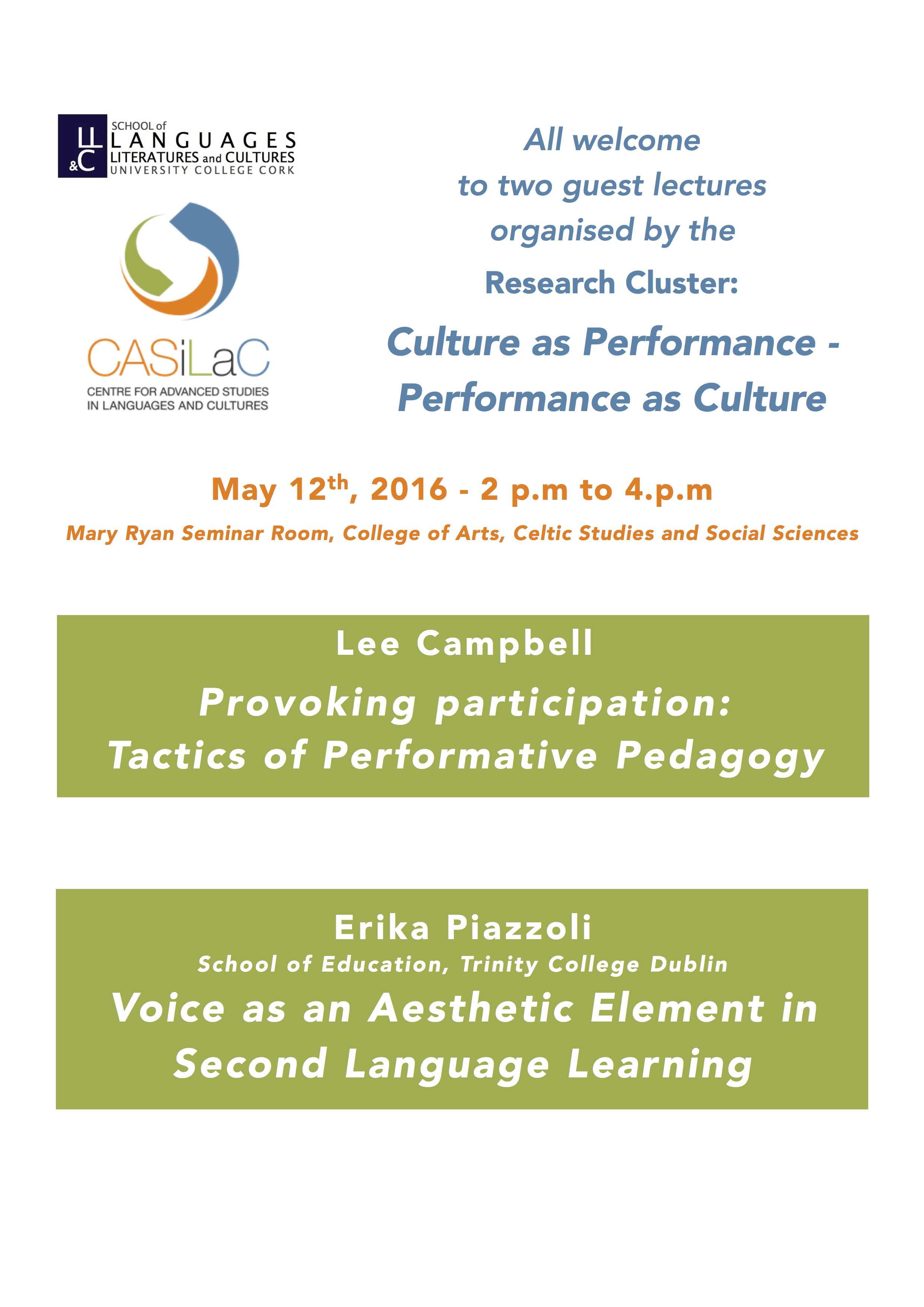News Archive
CASiLaC Cluster - Culture as Performance, Performance as Culture

CASiLaC Cluster - Two Events, Thursday May 12th 2016, in the O'Rahilly Building, G27
Lee Campbell
Provoking Participation: Tactics of Performative Pedagogy
May 12th, 2016 – 2 p.m. to 3 p.m.
This talk relates to my usage of performative aspects within pedagogic process and disseminates important aspects of my pedagogic strategy relating to how I apply my knowledge and expertise as an artist of generating performance practice with an emphasis on participation to my classroom. The talk will begin with a reflection upon my experience of working as an EFL teacher in London in the 2000s as being really significant in terms of how I initially structured the form and content of my teaching sessions in order to include performative techniques as methods to provoke learner participation, heighten engagement, nurture creative ability and facilitate learners getting to grips with the target language. I will then explain how I currently use performative pedagogy (with an emphasis on technology) in my teaching practice as the result of me being awarded a Loughborough University Teaching Innovation Award 2015-2016. As part of my discussion, I will share a three-stage teaching process that I have designed. This process - Anticipation, Action, and Analysis – extends an existing model of reflective practice (Rolfe, 2001) and has been described as an ‘original, practical and imaginative way of demonstrating reflective practice’ (Newbold, 2016).
As part of the talk, audience members will have the chance to engage in an interactive element using Textwall.
Lee Campbell is an artist and academic based in London. He is a lecturer in Fine Art at Loughborough University, visiting lecturer in Advanced Theatre Practice at Royal Central School of Speech and Drama London and also contributes to the MA Programme in Fine Art, Cambridge School of Art, Anglia Ruskin University.
Erika Piazzoli, School of Education, Trinity College Dublin
Voice as an Aesthetic Element in Second Language learning
May 12th, 2016 – 3 p.m. to 4 p.m.
When speaking in a Second Language (L2), voice is strongly connected to emotion, intercultural identity and self-perception. As Van Lier (2004) notes, L2 students may be feeling tongue-tied, unable to confidently utter new sounds, if their new cultural identity is not a choice, but has been ‘allotted’ to them - creating a barrier between their thoughts and their selves. On the other hand, when students become agents of their own language learning choices, they can develop an ability to infuse emotion, and meaning, into language. In this interactive presentation, participants are invited to reflect on voice as an aesthetic element of language learning, in relation to identity, culture and self-perception. First, I will situate the discussion in the context of voice studies and language learning. Next, I present findings from my PhD on the aesthetics of L2 learning through process drama – with a specific focus on the aesthetics of voice and identity. I illustrate an example from one of my doctoral case studies, an L2/drama class on voice and identity, with international students enrolled in the Cultural Mediation undergraduate programme at Università Statale di Milano (Italy). I argue that drama-based strategies with a focus on voice and identity enabled the participants to exercise agency, using various degrees of dramatic irony to make sense of their intercultural identity.
Dr Erika Piazzoli is Assistant Professor in Arts Education at Trinity College Dublin, as well as Research Fellow (adjunct) at Griffith University, Brisbane (Australia). Her research interests are embodiment, teacher education, aesthetic learning and languages education. Her research focuses on the aesthetics of drama-based Second Language teaching.
